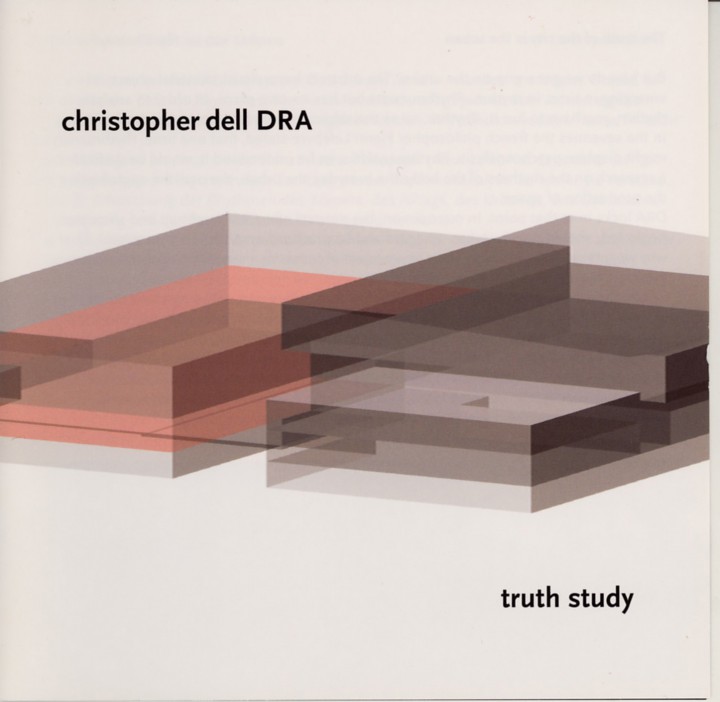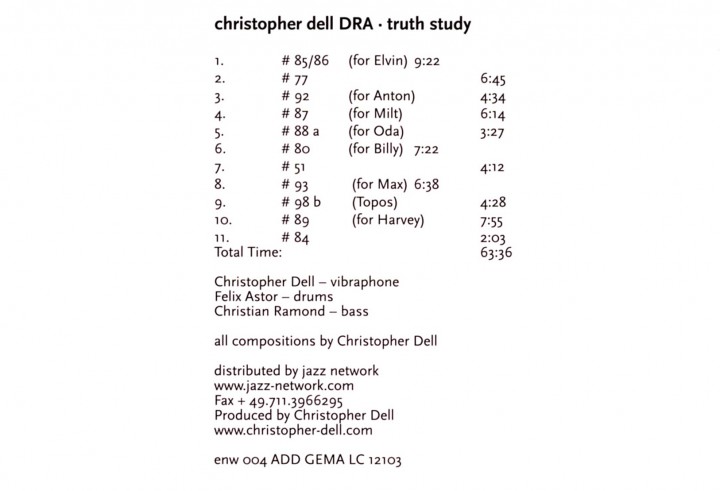Christopher Dell DRA Truth Study


order hard copy CD via invoice for 15 Euro at: info@niehler-werft.de
Christopher Dell DRA
Truth Study
Truth Study is the studio recording of DRA’s second program. The recording is the continued manifestation of the constant new-working of compositional material that is the core of DRA. One might even claim that DRA was the first ensemble to bring the theme “research” discursively on the table in the contemporary jazz scene. DRA was and is famous for rehearsing, researching a lot but performing only rarely in public. Along these lines one can label DRA as discursive laboratory ensemble. The recording took place at bling bling studios Berlin on December 17th and 18th 2005.
Track List:
- # 85/86
- # 77
- # 92
- # 87
- # 88a
- # 80
- # 51
- # 93
- # 98b
- # 89
- 84
- total duration: 01:03:30
Line Up:
Christopher Dell vibraphone
Christian Ramond bass
Felix Astor drums
Composition and concept by Christopher Dell
recorded by Luc Berger bling bling studios
Mastered by Tom Müller
Produced by Christopher Dell
The Truth of Space
How to get a grip on the urban? The urban is not a visual, material object per se, not a “thing in itself”. It is emerging in time, in rhythm. Rhythm exists but has no own place. In order to analyze, to find rhythm, one has to live it. Rhythm, so as the urban, cannot be preconceived, planned. In the seventies, the French philosopher Henri Lefebvre stated that at one point in the future rhythmanalysis might replace psychoanalysis. Rhythmanalysis, as he understood it, would be dedicated to research on the rhythms of the body, the everyday, the urban as process, the use, the appropriation and the production of space. DRA locks in at that point. In our opinion, the notion that Lefebvre brought up—and which was neglected ever since—should now be taken up again and be practiced on a contemporary level. That is why we interpret our music rather as a project of research than as an aesthetic endeavor (which it also is, no doubt about that). Conducting this research, we take into account that while directing the research towards the musical space, we are part of the research ourselves: we analyze the space and produce it at the same time. Thereby, the urban is our conceptual lens. It constitutes for us a layering of multiand polyrhythmic levels and diagrammatic planes, of complexity that is lived and embodied. It is against this background that we reject the notion of true space as a space that has a predetermined form, which is composed in an externalized space of neutrality and reason and then projected into reality. Our concept of “truth study” is concentrated on the truth of produced space: the lived and experienced linkage of social practice and critical theory, without being reducible to it. [Concept text for the recording Christopher Dell DRA, truth study, published in a booklet by enw, Berlin, 2006.]